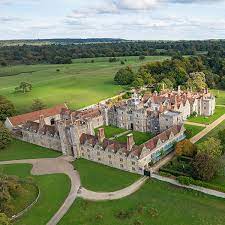
- This event has passed.
A Storytelling House Tour with Robert Sackville-West
March 21, 2023 @ 6:00 pm - 7:00 pm

We’re pleased to host Lord Robert Sackville-West, the 14th-generation proprietor of Knole, a fabled country house that combines a unique familial narrative with an equally enchanting literary pedigree.
A former archbishop’s palace located in Knole Park, Sevenoaks, United Kingdom, Knole is known for its legendary “calendar house” layout, which features 365 rooms, 52 staircases, 12 entrances, and seven courtyards. Robert will walk us through everything Knole has to offer, from the state rooms—with outstanding tapestries and the finest collection of 17th-century Royal Stuart furniture in the world—to the private apartments filled with portraits by Van Dyck, Gainsborough, Sir Peter Lely, and Reynolds. He will also share stories from his time restoring the residence, as well as tales from 400 years of family history. The end result promises to be a a vivid and transportive mental portrait of a truly iconic house.
Don’t miss this rare opportunity to experience one of great estates through the eyes of the person who knows it best.
Tickets are $40.
To purchase tickets, please click here or call 843-723-9912.
About the Author:
Robert Sackville-West, 7th Baron Sackville, studied history at Oxford University and went on to work in publishing. He now chairs Knole Estates, the property and investment company that, in parallel with the National Trust, runs the Sackville family’s interests at Knole.
The Sackvilles have inhabited the titular estate and one of Britain’s greatest houses, for more than 400 years. In his book, Knole: A Private View into One of Britain’s Great Houses (Rizzoli 2022), Sackville-West captures the beauty of the historic property alongside the stories of his ancestors who inhabited his family home. From the grave Elizabethan statesman to the good-for-nothing gadabout at the seedy court of James I, the dashing cavalier, the Restoration rake, and the 3rd Duke of the ancien régime–these ancestors have been described by Vita Sackville-West (born at Knole) as “a race too prodigal, too amorous, too weak, too indolent, and too melancholy.”
